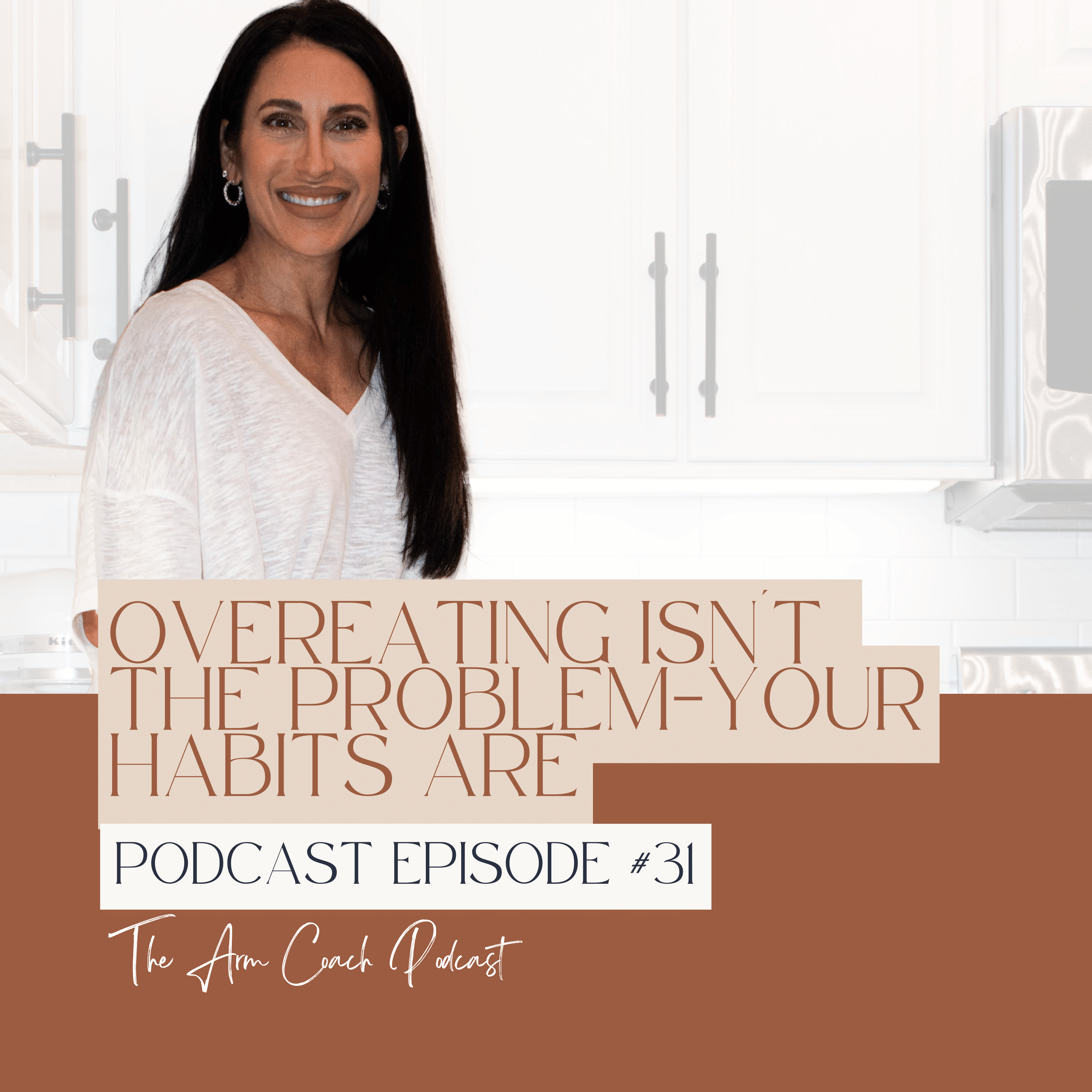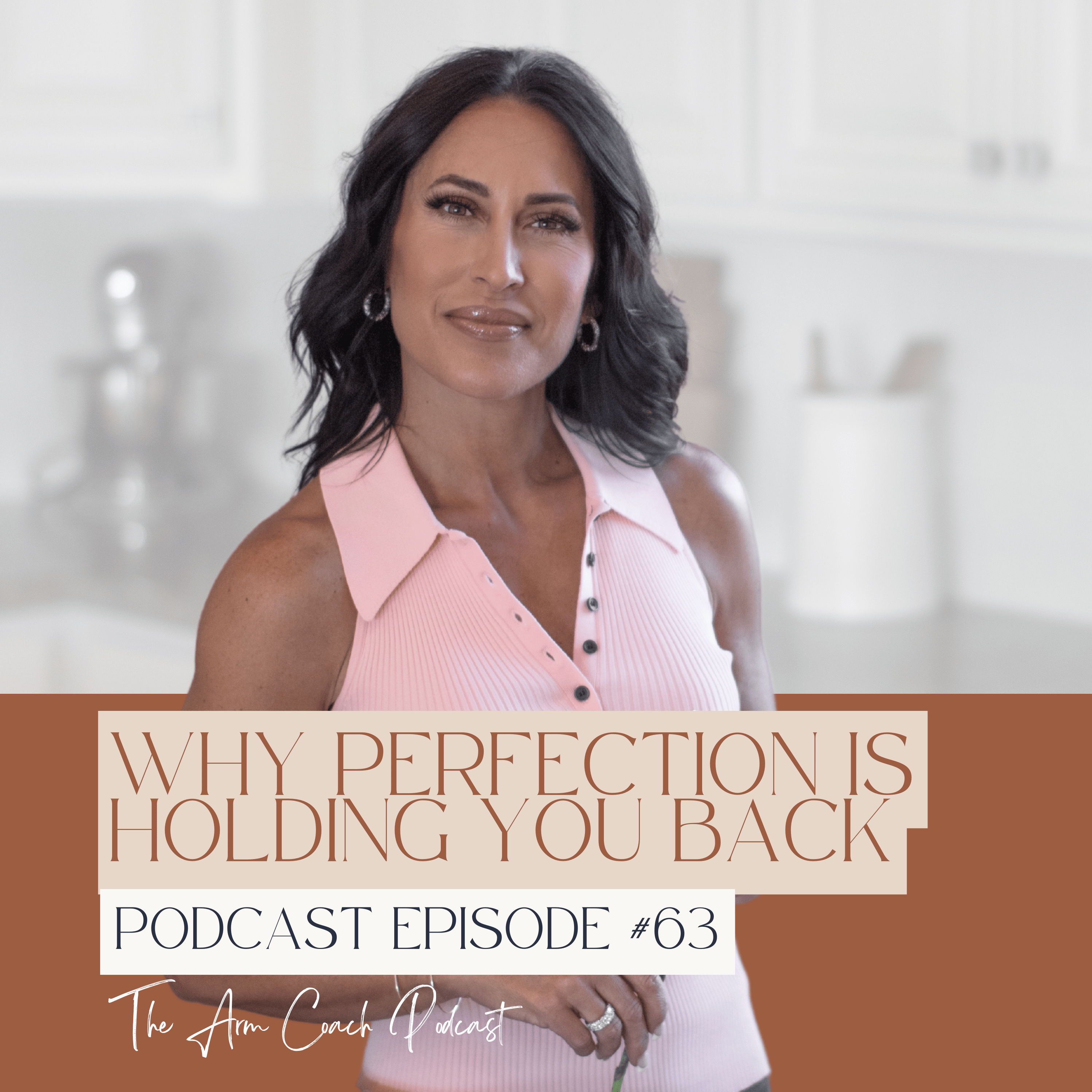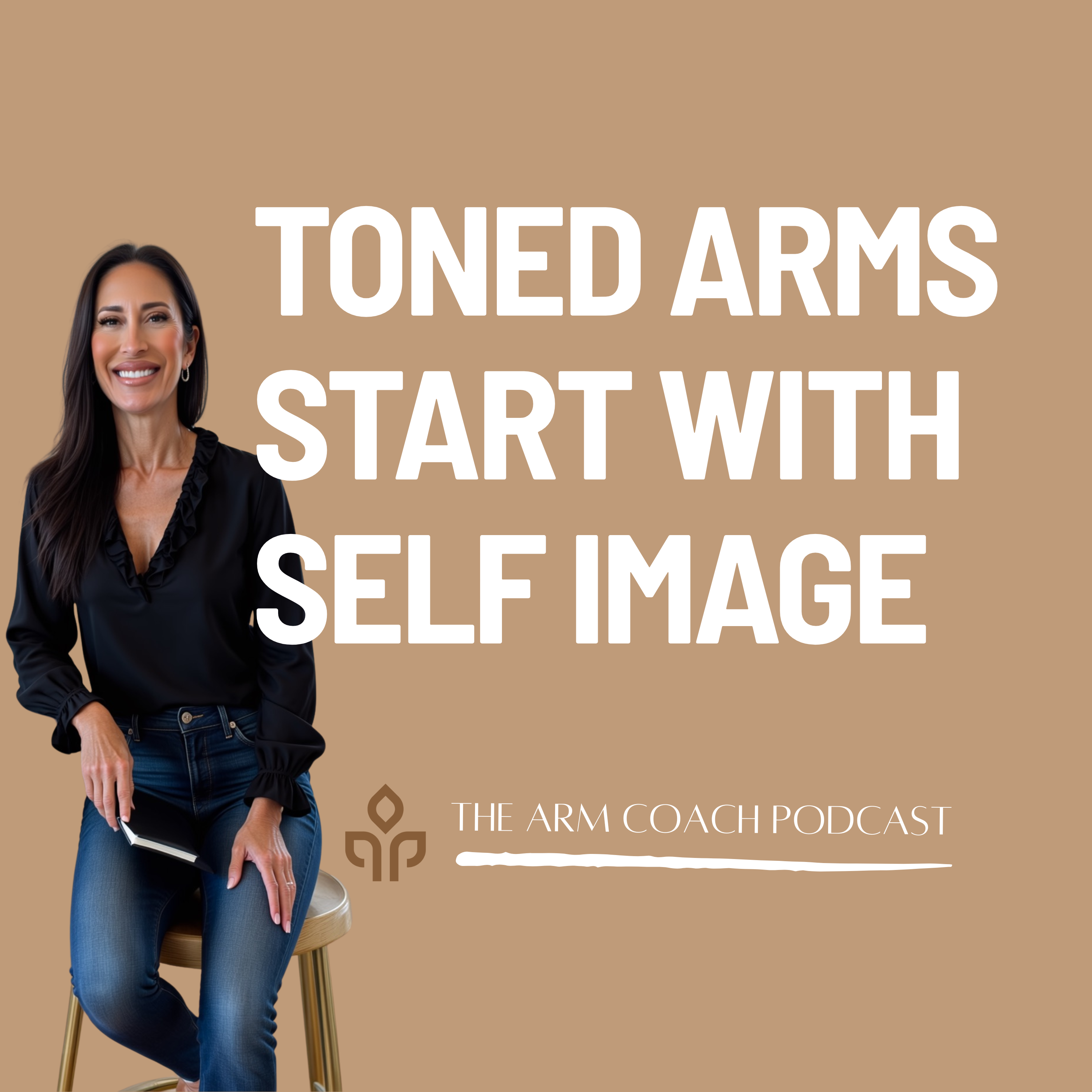Episode Transcript
Hi, everybody, and welcome to The Arm Coach podcast, episode
#10.
What are you doing right? Because where you put your focus
determines how well you'll do on any exercise or eating program.
Today we're gonna talk all about focus. What it is. Why it's
important. Where most of us put our focus. And how to change.
So let's get started.
What is focus, and why is it so important? Well, focus is the
intentional placement of your energy on something, your mental
energy. It's where you pay attention. We think it's just something
that happens automatically. But actually we have a lot of say in
how we do it. We’re just not aware of it. So when you're learning
something new, you use a lot of focus, you use a lot of intentional
thoughts. When you're trying to sculpt your arms or change the
way you're eating, you focus more clearly on what you're doing.
But often, what I see, is that you focus on what's going wrong.
You focus on what you don't want. So you set goals, you try to
do something, you may do it partially right. And then you fail. But
of course you fail, because failing is part of learning right?
There's nothing going wrong here. But then you focus on the
failure. And that's the big mistake. Remember how our thinking
works, something happens, we have a thought about it, that
thought helps us create our emotional feeling, and the feeling is
what drives us to take an action. So if you think ‘darn, I failed
again’, then you create the feeling, something maybe like
hopelessness, and the action you take is to quit, or continue
what you're doing but with a really negative attitude, and taking
actions, but they feel really forced. Your goal is to move forward
with ease. Now, where do most of us put our focus? We need to
focus to reach our goals, right? And to take steps and especially
to make changes. We need great awareness to do this. When I
speak to my clients each week during our calls, very intentionally,
the first thing I asked them is, ‘What’s going well? What do you
feel proud of? What are you doing right?’ Because when I don't
ask them that question, most clients tell me all the things they did
wrong. You unknowingly focus on what you don't want and what
you do wrong, and you discount what you did right. This makes
moving forward, much harder. It's harder to stay on the road long
enough to see results when you focus on what you don't want
and on mistakes you make. Because you feel bad. And then you
want to quit, or you just take actions that don't help you, like eat
a whole bag of chips. So where does this pattern come from? It
comes from the way that your brain is wired for survival. Good
things are experienced in your brain like Teflon. Like a Teflon pan,
where nothing sticks when you cook. You think something, and
then you get a quick feeling, but that quick good feeling fades
away really quickly. We are wired to focus on what's not going
well, because it's meant to protect us from a potential threat. So
for example, if you're going through the graduation party season,
you went to a party, and you're at this party but you’re not hungry
and the food is beautiful, but you're honestly not physically
hungry. You check in with yourself, and you didn't eat. That's a
wonderful big major accomplishment of breaking a pattern of
eating just because we're around food and doing it so quickly
that we don't even notice. So we noticed what we did, really
quickly, we feel proud really briefly, but then we go right back to
thinking about all our mistakes. Another example is, you had a
really good week. You moved your body. You did your arm
exercises. You planned your meals and the food was ready and
available and prepped. And on one day, you went to the movies,
and you unconsciously finished a giant container of popcorn,
without a lot of awareness. And when I ask that client how her
week went, she'll focus on what went wrong, and discount all the
good things that she did. So the bad things, to us, to our brains,
are like Velcro. They stick in our brain. They stick easily. We're
trained, through millions of years, to look for threats, for
problems. Because our survival used to depend on us being so
aware and vigilant and ready to run or defend ourselves in a
moment. That's why our brain does that. The good thoughts and
the good feelings that we experience, float away quickly, like
Teflon, and the negative stuff stays with us. Now we don't have
giant threats. Thank goodness. We are our biggest threat in our
life. But we habitually say things like this. How was your
weekend? Well it was okay, but I overate some dessert. And
when my clients tell me this, it sounds so emotional and so awful
to them, I could tell that they feel terrible. Like they murdered
someone, something really awful. And I guide them back to what
went well in their week, because I know it's too easy for them to
focus on what did not go well. You tend to stay stuck in your
problem and you've been thinking this way for so long that it's
hard to even see that you're doing it. Now if you were my client
you might continue thinking this way. And you might think
something like ‘Well I messed up, and now everything's just
down the drain. All my hard work has gone. I'm starting all over
again.’ When you think this way, ‘it's all down the drain, I'm
starting all over again’, the feelings that you create, again, are
hopelessness. And that is so uncomfortable, that if you're an
emotional eater like most of us are, you may be so uncomfortable
that you’re gonna be driven to overeat, again to get away from
the feeling. Can you see how this focus on the small mistakes
that you make, which I would like you to think of as small
learning points that you make, are going to make things harder
for you? So what should you put your focus on? You need to put
your focus on what's going well. On what you want and what
you're doing right, even if it's tiny. If you put your intentional
focus on what you're doing right, you're going to create feelings
like excitement, hopefulness confidence, optimism. These
emotions, they're going to carry through to the decisions that you
make, the actions you take. And when you do that over and over
again you're going to get the results that you really want. Now,
you may be worried that thinking this way and focusing on the
good will feel fake. Because you may be thinking, ‘but everything
I do is not good. Everything I do is not right.’ It's not that you're
faking it. It's more that you're choosing where you want your
attention to go. When you do something you wish you hadn't
done, I don't want you to ignore it. I don't want you to bury your
head in the sand or totally dismiss it and pretend it never
happened. I want you to learn from it, but, I want you to learn
from it in an unemotional, no drama, just the facts way. So here's
an example of how that works. Let’s say, you skipped your arms
exercises. You ask yourself, ‘Well, why did I do that?
I wonder what happened.’ Play detective here. What do you wish
you could do if you had an instant replay? What's your lesson,
and then move on. Forgive yourself. No Velcro here. And then go
right back to focus on what you did right, instead of ‘I did these
things well but I also did this’. I want you to think in reverse.
Acknowledge your slip. But then focus on what went well. I
slipped a little bit here, but look at all the great stuff I'm doing.
Bringing your focus back to what you're doing right. It's really
essential to staying on the path to sculpted arms. So, how can
you retrain yourself to bring your focus back to what's going well
and what you're doing right? Well first, there are questions that
you can ask yourself at the end of each day. That's going to help
you stay focused on what you want. Questions like, ‘What did I
do well today? What do I feel proud of? What am I excited
about?’ And then, ‘What have I been challenged with? And how
can I do better next time?’ Notice how much better the phrase
“challenged with” sounds than “what did I fail at”. And then
compassionately allow yourself to move on. So what's going
well, is the big intentional focus. And here's another thought
about what we should focus on. You need to take the bulk of
your focus off your end goal, and put it on your process.
Remember that we talked about setting an end goal, and really
visualizing how you want things to go. Where you want to be
when you reach your goals. How you want to feel. What you want
it to look like. How your day will be. I still want you to do that. I
want you to have a vision that you're working toward. But here's
the truth. Your end goal takes time to reach. And it's easy to get
stuck with the daily things of life. And to feel like that end goal is
a long, long way to get there. But the process, which is the day in
and day out steps that you're going to take, that's what's going
to get you there. And if you do the process. If you take those
steps, day in and day out, you will get to the end goal, without
worrying about it. So remember the process is three main things.
How you exercise and eat. How you manage your mind. And how
you take care of yourself.
So if you're focusing every day on these three ongoing
processes, I want you to find ways to love them. I want you to
look at yourself and the actions that you take without judgment.
You're not giving yourself a great every day. Just be curious
about what you're doing and why you're doing it. And appreciate
every single step you take in the right direction. And appreciate
every single thing you learn when you make a mistake. Those
mistakes are valuable. If you don't use them to beat yourself up,
or to derail you or, to have an excuse to stop. So if you make
your focus on the positive, this keeps your mood mostly positive.
Remember, nobody's goal is to be happy all the time, every day.
If your mood is mostly positive, you're going to stay focused to
create that positive mood, and then it's going to be so much
easier for you to take positive actions. And eventually your focus
on the things that you're doing well and things that are going well
is going to become your new habit. And that habit, is what will
get you where you want to go. Not only will you get where you
want to go, get you to sculpted arms, but this is the important
thing, the journey there is going to feel so much better, than if
you continue to focus on what went wrong, what you didn't do,
and how you failed. And if the journey doesn't feel good, the end
results not going to feel good, if you even get there. So your goal
is to get sculpted arms, but to feel good along the way. Now
sometimes you may think that you've lost your focus. Maybe you
feel uninspired or unmotivated. It's hard for you to narrow in, to
zero in, on what you want and what's going well. Then it's up to
you to make an adjustment. To ask yourself questions. But they
have to be the right questions. It's not going to be helpful if you
ask yourself constantly, ‘Why can’t I do this? What's wrong with
me? Why can't I get it? Everyone else gets it but me. What's my
problem?’. Clearly, when I'm saying that, you can hear how
negative and harsh that sounds. That's not going to motivate me
to do what's right. But if you ask questions like ‘How can I do
this? instead of ‘Why can’t I do this?, How can I do this? How
can I do this and make it easier? What can I focus on that will
make me feel better? How can I make the whole journey lighter?
Then your brain is going to search for those answers. And those
answers will help you keep taking steps to where you want to go.
So keep making adjustments, until you notice a shift in your
mood. Now remember, we're talking about changing this habit of
focusing on something negative. Remember that habits don't
have to just be what you do. It's not just actions. But there are
habits of thought that we slip into very easily, and habits of
feeling. And if your focus keeps going back to the negative, just
know that it's just happening because that's what you've
practiced. Probably for a pretty long time. That's all it means.
And what you need to do, is keep noticing what you're doing,
and shifting back your focus to what you're doing right. The way
you will notice it is that your emotions will start to feel negative.
That's how you will know that your focus needs an adjustment.
One of the things that I like to have my clients do, is to keep an
ongoing list of what they're doing that they feel good about, that
they're proud of. Things that went well. Things they did. I don't
care how small they are. And then look back on that list daily to
remind yourself that you are making progress. Even if you don't
see it in the mirror yet. Because all those daily little things that
you do, the simplest little things as what you focus on, are going
to add up to big, eventual change. Remember that when you
make changes, they come from the inside out. So, you think a
little differently, and then you create different feelings, pretty soon
you're effortlessly making different choices, taking different
actions. And last, but eventually, you will see different results on
and in your body. But it's the last thing to show up. Now, that's
what I have today for you on focus. So that's all for now. I’ll see
you next week!


